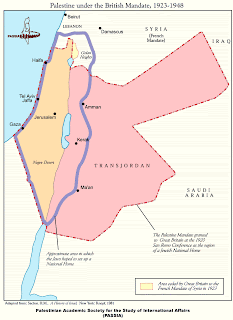Indeed, selective reporting is an indispensable component in the Propagandist's toolkit, enabling him or her to lead the reader to a conclusion that has been determined in advance by the writer. By omitting or obscuring key information in a story that would otherwise facilitate a more complete understanding of events and independent analysis, the Propagandist hopes to drive us to adopt, in uncritical fashion, his point of view.Propaganda is persuading people to make up their minds while withholding some of the facts from them.
Take for example, the "Timeline", prepared by Reuters' correspondent Bernd Debusmann (with reporting by Bureau Chief Alastair Macdonald), covering important historical dates in the Arab-Israeli conflict:
Here are key dates on the path to this point:
1897 - European Jews in Zionist movement declare goal of creating a Jewish state in Ottoman Turkish-ruled Palestine.
1917 - British forces take Palestine from collapsing Ottoman empire in World War One. British Foreign Secretary Arthur Balfour declares support for Jewish "national home" there.
1945 - Revelation of Nazi Holocaust and new Jewish migration to Palestine bolster Western support for creating Jewish state.
While a 600-word primer cannot possibly do justice to a topic as complex as the Middle East conflict, Debusmann omits a vast reservoir of essential historical detail, the absence of which substantially distorts the record and gives lie to his event summary for 1948.1948 - Britain quits and great powers recognize Israel as U.N. partition plan dissolves in war that leaves Jewish state on 78 percent of land and half of Palestine's Arabs as refugees.
Although Zionism as an organized political movement arose in Europe in the 19th century, Debusmann makes no mention of the millions of Jews in diaspora -- including some 900,000 Jews living in Arab countries -- who for centuries, had longed for restoration of the ancient Jewish home in and around Jerusalem. Debusmann's note only of "European Jews" is in keeping with the Arab and Reuters narrative of Israel as a product of European colonialism.
Debusmann then leaps from 1917 to 1945, omitting the seminal event of 1922 when Britain reneged on the original terms of the Palestine Mandate (which had called for a Jewish national home and "close settlement of the land" by Jews) simultaneously lopping off 78 percent of the territory and handing it to the Hashemite Arabs as a gift for their support in the war against the Ottoman Empire while banning Jewish immigration there. That territory -- Jordan today -- has a population which is over 60 percent Palestinian Arab and forbids Jews to reside or own land in the country.
Thus, Debusmann's event summary for 1948 suggesting that Israel retained the bulk of the land is mendacious; indeed it is the Palestinian Arabs who today reside on over 78 percent of the Palestine Mandate, in addition to those Arabs living in Israel.
Along the way to 1948, Debusmann conveniently forgets decades of violent Arab rejection of a Jewish sovereign including events which followed the British Peel Commission call in 1937 for partition of what remained of the Palestine Mandate and of course, the 1948 war which Debusmann refers to in a nondescript passive voice ("U.N. partition plan dissolves in war") making no mention of the declared aim by invading Arab armies to annihilate newborn Israel.
Absent these essential details, it is impossible for readers to fully appreciate the historical context of the conflict -- particularly unyielding Arab hostility to a Jewish state in the region -- and therefore to apprehend the "path to new Israel-Palestinian talks" advertised in Reuters' headline. But of course, facilitating reader understanding is not Reuters' objective.


Can you post a link to that factbox?
ReplyDeleteLink embedded in sentence: "Take for example, the Timeline, prepared by Reuters' correspondent Bernd Debusmann..."
ReplyDeleteHere too: http://www.reuters.com/article/idUSTRE62611T20100307